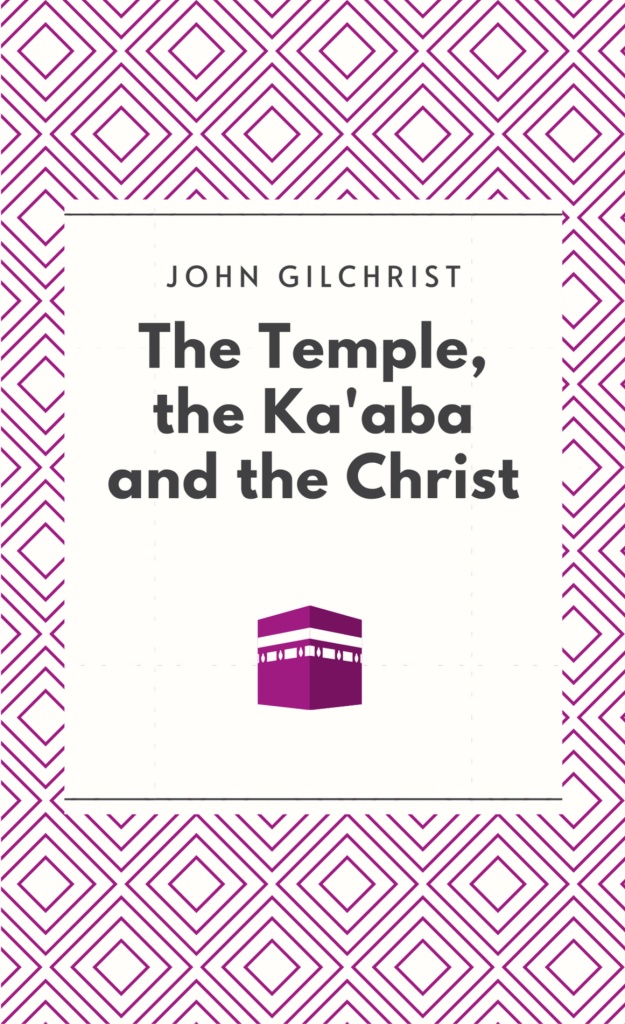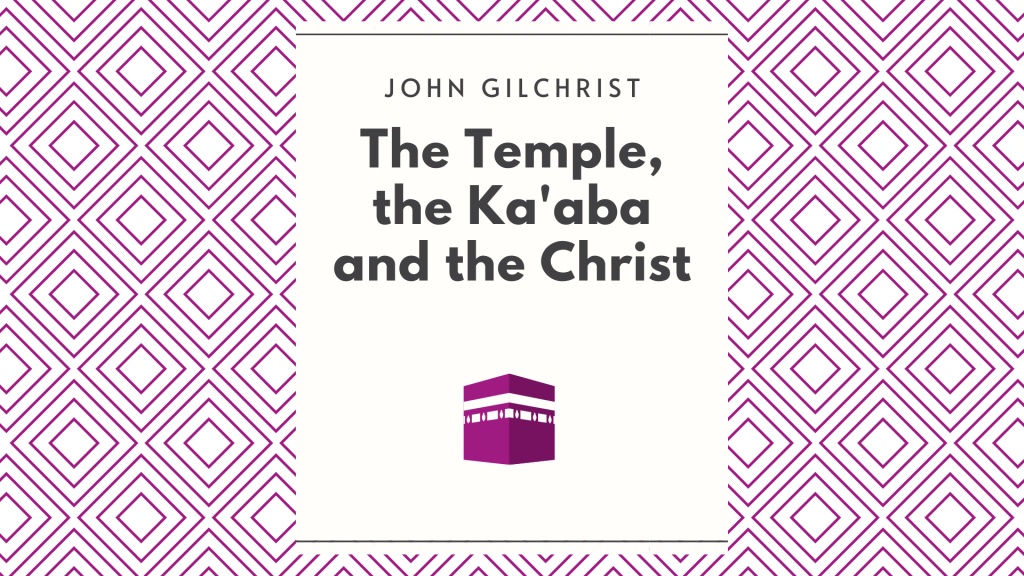The One Mediator Between God and Men
The Temple, the Ka'aba, and the Christ


Chapters
« Ch. 8 - Jesus and the Temple
Jesus had become instead, in his own person, the centre of true religion on earth. The Temple had merely foreshadowed and anticipated his coming but he, ultimately, is the identification and focus of worship between God and men. The purpose of praying towards the Temple and of pilgrimages to its feasts within its precincts was a way by which God through Christ had sought to draw the worship of the Jews towards himself. But even when Jesus himself stood among them in human form they opposed and rejected him. Their religion centred on the Temple but not on him. In distinguishing between Christ and the Temple, and by preferring the latter to him, the Jews lost the knowledge of God for it is in Jesus alone that the divine presence is ultimately revealed to men and through him alone that men can obtain access to God. Therefore he told them that their Temple was forsaken and that they would not in any way rediscover the path of access to God until they found it in him and admitted that he was indeed their Messiah and that the divine presence was henceforth to be manifested in him alone.
But how is this access obtained through Jesus to God? We must return to his saying, "Destroy this Temple and in three days I will raise it up" to find the answer to this vital question. Two days after Jesus pronounced God's judgement on the Temple he was arrested and put on trial before the Jewish leaders. Of all his sayings this one remained foremost in their minds. Two witnesses came forward and said:
"This follow said, 'I am able to destroy the Temple of God and to build it in three days'." Matthew 26:61
But Jesus had said nothing of destroying the Temple himself. What he did say was that when they destroyed it ho would raise it in three days - and by this he meant his own body as we have already seen. When they sentenced him to death and obtained permission to crucify him the following day, the sign Jesus had promised them was about to be fulfilled before their very own eyes. By having him crucified they were themselves destroying the temple of his body. Nevertheless, even as he hung on the cross others said:
"You who would destroy the temple and build it in three days, save yourself! If you are the Son of God, come down from the cross". Matthew 27:40
Jesus, however, intended to fulfil this prophecy in a far greater way than by coming down from the cross. He hung on the cross for reasons unknown to these scorners. Without realising it, by their efforts to have him put to death they were helping to fulfil his prediction. As ho died on the cross a remarkable thing happened:
The curtain of the temple was torn in two, from top to bottom. Matthew 27:51
The veil in the Temple which had for centuries signified that a sharp separation existed between God and mankind was torn from the top as an earthquake shook Jerusalem, signifying that God, from above, had torn down the barrier between men and himself through the death of his Son Jesus Christ on the cross. Jesus had died on the cross not because ho could not save himself but to save others from their sins. Three days later God raised him from the dead to fulfil the prophecy and sign ho had given to the Jews. He had overcome death and had conquered the power of sin. He had bridged the separation between God and men and forty days later ho ascended to the very presence of his Father in heaven above.
Ten days later the Holy Spirit descended from heaven in visible form, not into the Temple, hut into the very hearts of the disciples who had gathered in Jerusalem to wait for this event. Something greater than the Temple was indeed hero. By faith in Jesus his disciples gained direct access to God by the fact that the Holy Spirit came, not into a forbidden part of the Temple, hut right into their very own hearts. Until Jesus comes again men will only be saved and obtain access to God through faith in him. It is God's plan to unite all things in him - things in heaven and things on earth (Ephesians 1:10). This indeed was that which motivated Jesus to endure the cross far by this means he ensured that the last prayer he offered for his disciples would be answered:
"I do not pray for those only, but also for those who believe in me through their word, that they may all be one; even as thou, Father, art in me, and I in thee, that they may also be in us, so that the world may believe that thou hast sent me." John 17:20-21.
Instead of facing the Temple and making pilgrimages to Jerusalem, Jesus desired, by his abiding presence in heaven, to draw men through himself directly to God in true spiritual worship. The Christian has no Temple or Ka'aba, no holy place on earth. Instead ho has in heaven one who has gone before him right into the presence of God; and a holy city in the heavens ready to be revealed at the last time. The Christian has within himself, through the Holy Spirit which is given to him, direct access to God in heaven. Christ is in him and ho is in Christ. By this profound mystery, ho is actually represented in Christ who beholds and shares the glory of his Father without measure - and who has promised that that glory will be ours as well when he returns to earth at the end of time (John 17:24).
The torn veil was an everlasting sign that the death and resurrection of Jesus had broken down the barrier between God and men. Although the Temple had been a sign of God's presence in Israel, its stone walls and veil were really a reminder of God's absence from man. Only the High Priest could enter the Holy of Holies once a year and then only with the blood of a sacrifice as a symbol of atonement. That symbol was fulfilled through the death of Jesus on the cross. Through him all true Christians have access beyond the veil to God himself.
For Christ has entered, not into a sanctuary made with hands, a copy of the true one, but into heaven itself, now to appear in the presence of God on our behalf. Hebrews 9:24
When the Temple was destroyed it was a permanent proof of the fact that the barrier between God and man was forever broken down. The Jew could travel all the way to Jerusalem on pilgrimage but he could only touch the stones of the building. He could not obtain direct access to God. But in Jesus, no matter where he may be, the Christian has this access right into the presence of God's temple in heaven.
For through him we both have access in one Spirit to the Father. Ephesians 2:18.
Therefore Christianity indeed possesses that which replaced the Temple. This shrine was laid low at the time of Jesus to allow for a far better form of access to God. We look not to a house of stone made with hands but to a living person like ourselves who is seated on our behalf at the right hand of the very presence of God in heaven. Jesus, in heaven, is indeed our "qiblah" All we do or pray is done in his name.
This shows that the Ka'aba is not relevant to God's dealings with man in this age. The Ka'aba, in its resemblances to the Temple, is only a symbol of the barrier that once existed between God and man - and also a symbol, perhaps, of the gulf that still exists between God and those that have not experienced renewal and access to him through faith in Jesus. Like the Jews before them, the Muslims can only touch stones; but in Jesus Christ we have access, through the Spirit he has given us, directly to God our Father in heaven. No cloud of glory filled or settled on the Ka'aba when Muhammad had all its idols destroyed after the conquest of Mecca.
The glory of God had settled on the Temple when Solomon dedicated it to God and later upon Jesus himself when he was transfigured but no such thing happened when Muhammad consecrated the Ka'aba for the worship of Islam. The glory of God, instead, will forever be vested in Jesus Christ and will be manifested again when Jesus returns at the end of time. This glory is also available to all who turn to God through faith in him. When he is revealed in all his glory, then the righteous too will shine like the sun in the kingdom of their Father (Matthew 13:43). For this reason Jesus declared in the Temple itself on the great day of the Feast of Tabernacles:
"If any one thirst, let him come to me and drink". John 7:37
We look, not to buildings made with stone on earth, but to the best of qiblahs, a living Saviour who has given us direct access to God, Jesus Christ himself. In the words of Peter, one of the closest disciples of Jesus, we appeal to all Muslims:
Come to him, to that living stone, rejected by men but in God's sight chosen and precious. 1 Peter 2:4-5.
In him, Jesus our Lord, salvation, forgiveness of sins, the knowledge of God, the assured hope of glory and the indescribable anticipation of eternal life are vested. He alone is the "living" stone, in him alone will men ever find access to the living God of heaven.
There is salvation in no one else, for there is no other name under heaven given among men by which we must be saved. Acts 4:12.
Will you not forsake vain things which cannot profit or save by turning away from rites and ceremonies which concentrate on stones and other lifeless objects and turn instead to the living way which brings eternal life? Will you not turn to him, to Jesus Christ, and so become a partaker of the glory that is to be revealed? Will you not submit your whole life to him and follow him as your Lord and Saviour? He is alive in heaven and is ready to receive you now. Will you not commit yourself to him and receive the living Spirit of God which he is willing to pour into your heart?